Please fill out the following information, and RRFC Admissions will contact you to discuss our program offerings:
Issue #181
by L. Swift and Jeff McQ
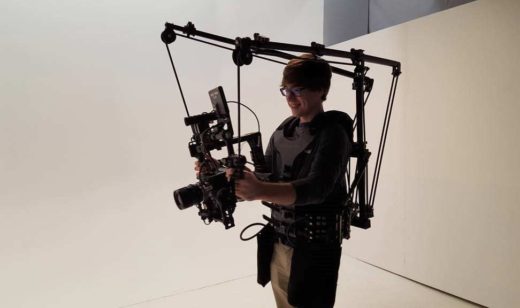 When we talk with Film Connection mentors across the country, one thing they say repeatedly is that they look for apprentices with serious passion and tireless dedication—people who are willing to open their minds, take the initiative and put in the work. The reason: These are the people most likely to succeed. In the eyes of the film industry, this is the “right stuff.”
If that’s the standard to shoot for, Film Connection student Jason Reinhardt (Atlanta, GA) has the “right stuff” in spades. So much so that he’s managed to go through his basic apprenticeship with Steve Carmichael at Rite Media in Atlanta, get himself heavily involved in numerous film projects AND sign up for the master’s screenwriting program—all while going through his senior year of high school and working at his father’s shop for extra cash!
“I hit the ground running, basically,” he says. “I got a bunch of planners and everything, like a calendar, and I’d always make sure that I’d coordinate with [my mentor] Steve…That’s just kind of how we went about it…It was a balancing act in the end, really, but it was a good way of learning how to manage time.”
Already committed to pursuing film as a career, Jason had begun scoping out film schools by his junior year, most of which obviously told him to call back in a year. But when he discovered the Film Connection, Jason saw it as a chance to quickly get immersed in the industry.
“I was looking at Full Sail and I was actually in the middle of the application process for them,” says Jason. “But I halted that the moment I saw Film Connection, what it offered, and what kind of situations I would be put into, and it just seemed like a far better deal and a better chance for me to learn in an actual business environment and experience what people would be doing day in and day out.”
Going through his apprenticeship, Jason says Steve not only went the extra mile to make sure he understood the concepts, but he went out of his way to make sure he had opportunities to work with the gear in a tangible way. “It was just a blast,” he says. “It didn’t feel like I was actually “learning” from a textbook, but it was more like getting hands-on, and that’s what I felt this program was about. So it was really great to really experience hands-on training and practice with that.”
Along the way, Jason says he found a hidden interest in screenwriting while working with his screenwriting mentor, Ron Peterson.
“When we first started writing, I wasn’t necessarily a strong writer,” says Jason. “After my first whack at it, he critiqued it, and I took his critiques to heart and I went about writing it and thinking how he would go about it, then adding my own personal touch to it. Then the second time that we called he was like, ‘Wow, this is much better. You sure nobody typed this for you?’ He’s asked me that multiple times as we progressed throughout the script, because I’d just take everything that he said and apply it to what I was writing, and ensure that I was gaining the most from this experience.”
When we talk with Film Connection mentors across the country, one thing they say repeatedly is that they look for apprentices with serious passion and tireless dedication—people who are willing to open their minds, take the initiative and put in the work. The reason: These are the people most likely to succeed. In the eyes of the film industry, this is the “right stuff.”
If that’s the standard to shoot for, Film Connection student Jason Reinhardt (Atlanta, GA) has the “right stuff” in spades. So much so that he’s managed to go through his basic apprenticeship with Steve Carmichael at Rite Media in Atlanta, get himself heavily involved in numerous film projects AND sign up for the master’s screenwriting program—all while going through his senior year of high school and working at his father’s shop for extra cash!
“I hit the ground running, basically,” he says. “I got a bunch of planners and everything, like a calendar, and I’d always make sure that I’d coordinate with [my mentor] Steve…That’s just kind of how we went about it…It was a balancing act in the end, really, but it was a good way of learning how to manage time.”
Already committed to pursuing film as a career, Jason had begun scoping out film schools by his junior year, most of which obviously told him to call back in a year. But when he discovered the Film Connection, Jason saw it as a chance to quickly get immersed in the industry.
“I was looking at Full Sail and I was actually in the middle of the application process for them,” says Jason. “But I halted that the moment I saw Film Connection, what it offered, and what kind of situations I would be put into, and it just seemed like a far better deal and a better chance for me to learn in an actual business environment and experience what people would be doing day in and day out.”
Going through his apprenticeship, Jason says Steve not only went the extra mile to make sure he understood the concepts, but he went out of his way to make sure he had opportunities to work with the gear in a tangible way. “It was just a blast,” he says. “It didn’t feel like I was actually “learning” from a textbook, but it was more like getting hands-on, and that’s what I felt this program was about. So it was really great to really experience hands-on training and practice with that.”
Along the way, Jason says he found a hidden interest in screenwriting while working with his screenwriting mentor, Ron Peterson.
“When we first started writing, I wasn’t necessarily a strong writer,” says Jason. “After my first whack at it, he critiqued it, and I took his critiques to heart and I went about writing it and thinking how he would go about it, then adding my own personal touch to it. Then the second time that we called he was like, ‘Wow, this is much better. You sure nobody typed this for you?’ He’s asked me that multiple times as we progressed throughout the script, because I’d just take everything that he said and apply it to what I was writing, and ensure that I was gaining the most from this experience.”
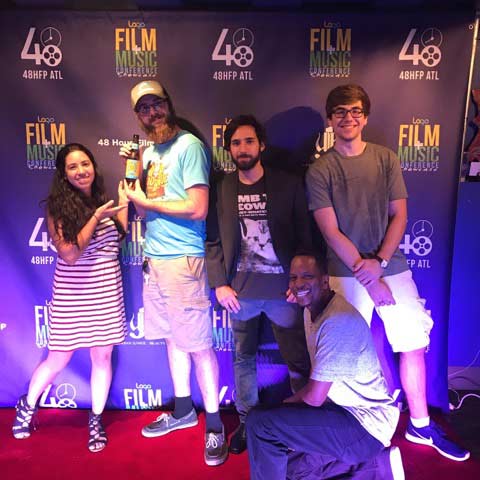
“It’s Electric” crew: Angelica Perez-Castro (2nd AC),
Zakk Martin (DP), Kenneth Scofield (2nd AC),
Bryan Clemmons (grip), Jason Reinhardt (PA)
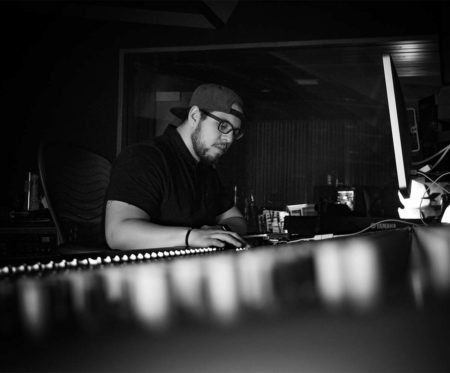 ON THE STUDIO ENVIRONMENT AS A “CREATIVE BUBBLE” AND BEING SENSITIVE TO ARTISTS DURING THE CREATIVE PROCESS:
“It’s a creative bubble, and it can go in any direction. It’s like the slightest thing can send a session going where it won’t be—It’s all just the rollercoaster of the session, and every session is different. So it’s like you kind of have to acclimate to it, and not just by the stuff that you know, but more of just like being a psychiatrist sometimes…kind of letting the client know that this is a comfortable place to record…You want to word things positively…There are so many ways of doing it, but you just want…to be like, ‘Hey, that was a great take, but maybe we could get one better,’ or something like that.”
TIPS ON COLLABORATING WITH OTHER ARTISTS:
“I’ve collaborated with a few artists. I feel like there’s almost a studio etiquette to that, too, to not just being like the person that, ‘Okay, I want to do things my way and we’re not going to listen to you,’ you know? It’s more of having an open mind, and I feel like you have to visualize it as a creative bubble, and you’re letting the collaborator be in the creative bubble with you to co-produce something…You learn different workflows and how people work. It’s all different. And you pick up on things yourself, too, so that you can better your workflow, because I mean, I feel like everyone is always going to be constantly learning. That’s just part of this career path, because there’s always going to be new gear, new this, new that.
You’ve got to leave that [ego] at the door. You have one goal as a co-producer: To make something sound good, make something good, create something good. So it’s like if you have some sort of negative vibe, it’s not going to work. You’ve got to have an open mind.”
PRACTICAL TIPS ON HIP HOP PRODUCTION:
“As a hip hop producer, it’s more of knowing dynamically how to arrange things and just really having an ear for it. I mean, producing-wise, just having an ear for it and thinking outside the box, too…
The bass, the drums, they always need to be up. And everything else I feel like can kind of fall back a little bit. It’s just very situational, but most of the time it’s just drums and bass is what the listener wants to hear most, and vocals once the vocals are in…
In mixing a hip hop track, the bass can get crazy. So it’s being sure to control that bass, because in a hip hop track it’s like I want to hear the bass, but I want to hear it in certain frequencies. So what I’ll usually do is round off a little bit of the low end…I want that punch, but I don’t want the sub-y sub, because there can be pretty uncontrollable sub frequencies that you really don’t need…That’s why I take it out, because that mud is just—and a lot of people just bring up the bass and they’re like, ‘Okay,’ and they’ll call it a track. I usually get a lot of tracks that come in that the bass is just pushed up all the way and there’s not much I can do as far as working with the track…It’s just something that I wish all producers knew, you know, the bass can just get a little bit out of hand sometimes.
For hip hop, what I’ll usually have them do is run like five takes or whatever it needs, and based on the first couple of takes I can direct the other takes, like tell them, ‘You need more energy,’ or maybe if the song is a little cooler, ‘You kind of want to relax a little bit.’ But it’s just having that line of communication with the client and telling them, directing them in a way that they come out with a great product. That’s definitely something that’s key, because if you have a bad recording you only have so much to work with, but if you have a great recording, you can only get better from there…Good in, good out.”
ADVICE ON THE GEAR YOU NEED:
“Students always ask me, ‘What should I get? What kind of interface should I get?’ I kind of try to direct them in the proper direction, like a good DJ converter with some flat speakers, just something that is perfect for mixing. Not everyone is going to mix, or is just going to mix. I have some students that want to produce as well. So maybe they’d want to use something else, like some KRK’s that have a little bit more of the low-end boost. Every student is different, everyone has a different learning style and I try to acclimate to that…Everyone has a different budget, everyone has different needs. So it’s all very situational.”
ON WHY HE ENJOYS MENTORING STUDENTS:
“I really like teaching…I always try to look at the younger version of me and help them out. That’s what I want to do [with] these apprentices, the students that come in. I just want to help them out as much as possible and give them the information that I had to learn on my own sometimes…I tell them right off the bat that this is going to be like a job: Coming in on time, being professional during sessions, having the studio etiquette and keeping everything professional, and then the approach, the actual learning is, I try to give them hands-on…I’d rather guide them instead of them being at home kind of stuck on something and feeling discouraged or anything like that. It’s better for me to give them as much time for them to make mistakes, and I can just guide them…I’ve made my fair share of mistakes just so that you learn. Kinesthetic learners learn by doing. So if you make a mistake, you know that that’s a mistake. It’s that much more helpful to that sort of learner.”
FINAL WORDS OF ADVICE:
“Keep your head up. Opportunities are everywhere. It’s just about opening the door and running with it.”
ON THE STUDIO ENVIRONMENT AS A “CREATIVE BUBBLE” AND BEING SENSITIVE TO ARTISTS DURING THE CREATIVE PROCESS:
“It’s a creative bubble, and it can go in any direction. It’s like the slightest thing can send a session going where it won’t be—It’s all just the rollercoaster of the session, and every session is different. So it’s like you kind of have to acclimate to it, and not just by the stuff that you know, but more of just like being a psychiatrist sometimes…kind of letting the client know that this is a comfortable place to record…You want to word things positively…There are so many ways of doing it, but you just want…to be like, ‘Hey, that was a great take, but maybe we could get one better,’ or something like that.”
TIPS ON COLLABORATING WITH OTHER ARTISTS:
“I’ve collaborated with a few artists. I feel like there’s almost a studio etiquette to that, too, to not just being like the person that, ‘Okay, I want to do things my way and we’re not going to listen to you,’ you know? It’s more of having an open mind, and I feel like you have to visualize it as a creative bubble, and you’re letting the collaborator be in the creative bubble with you to co-produce something…You learn different workflows and how people work. It’s all different. And you pick up on things yourself, too, so that you can better your workflow, because I mean, I feel like everyone is always going to be constantly learning. That’s just part of this career path, because there’s always going to be new gear, new this, new that.
You’ve got to leave that [ego] at the door. You have one goal as a co-producer: To make something sound good, make something good, create something good. So it’s like if you have some sort of negative vibe, it’s not going to work. You’ve got to have an open mind.”
PRACTICAL TIPS ON HIP HOP PRODUCTION:
“As a hip hop producer, it’s more of knowing dynamically how to arrange things and just really having an ear for it. I mean, producing-wise, just having an ear for it and thinking outside the box, too…
The bass, the drums, they always need to be up. And everything else I feel like can kind of fall back a little bit. It’s just very situational, but most of the time it’s just drums and bass is what the listener wants to hear most, and vocals once the vocals are in…
In mixing a hip hop track, the bass can get crazy. So it’s being sure to control that bass, because in a hip hop track it’s like I want to hear the bass, but I want to hear it in certain frequencies. So what I’ll usually do is round off a little bit of the low end…I want that punch, but I don’t want the sub-y sub, because there can be pretty uncontrollable sub frequencies that you really don’t need…That’s why I take it out, because that mud is just—and a lot of people just bring up the bass and they’re like, ‘Okay,’ and they’ll call it a track. I usually get a lot of tracks that come in that the bass is just pushed up all the way and there’s not much I can do as far as working with the track…It’s just something that I wish all producers knew, you know, the bass can just get a little bit out of hand sometimes.
For hip hop, what I’ll usually have them do is run like five takes or whatever it needs, and based on the first couple of takes I can direct the other takes, like tell them, ‘You need more energy,’ or maybe if the song is a little cooler, ‘You kind of want to relax a little bit.’ But it’s just having that line of communication with the client and telling them, directing them in a way that they come out with a great product. That’s definitely something that’s key, because if you have a bad recording you only have so much to work with, but if you have a great recording, you can only get better from there…Good in, good out.”
ADVICE ON THE GEAR YOU NEED:
“Students always ask me, ‘What should I get? What kind of interface should I get?’ I kind of try to direct them in the proper direction, like a good DJ converter with some flat speakers, just something that is perfect for mixing. Not everyone is going to mix, or is just going to mix. I have some students that want to produce as well. So maybe they’d want to use something else, like some KRK’s that have a little bit more of the low-end boost. Every student is different, everyone has a different learning style and I try to acclimate to that…Everyone has a different budget, everyone has different needs. So it’s all very situational.”
ON WHY HE ENJOYS MENTORING STUDENTS:
“I really like teaching…I always try to look at the younger version of me and help them out. That’s what I want to do [with] these apprentices, the students that come in. I just want to help them out as much as possible and give them the information that I had to learn on my own sometimes…I tell them right off the bat that this is going to be like a job: Coming in on time, being professional during sessions, having the studio etiquette and keeping everything professional, and then the approach, the actual learning is, I try to give them hands-on…I’d rather guide them instead of them being at home kind of stuck on something and feeling discouraged or anything like that. It’s better for me to give them as much time for them to make mistakes, and I can just guide them…I’ve made my fair share of mistakes just so that you learn. Kinesthetic learners learn by doing. So if you make a mistake, you know that that’s a mistake. It’s that much more helpful to that sort of learner.”
FINAL WORDS OF ADVICE:
“Keep your head up. Opportunities are everywhere. It’s just about opening the door and running with it.”
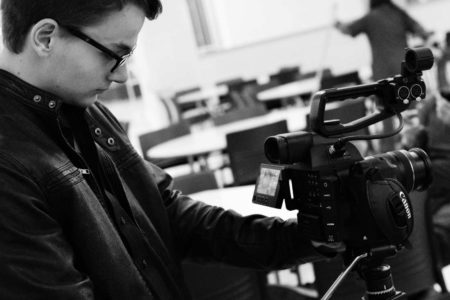 Film Connection student Jacob Sizemore (Dallas, TX) knows the road ahead isn’t an easy one, but he’s up for the challenge. “Normal people seem to have a certain fanaticized idea of how to make a movie. ‘It’s simple right? Just take the camera, push record, say your lines. Easy.’ I only wish it was that simple. I have made several short films in the past and have gone through many struggles that all filmmakers go through on a daily basis. That being said, I am still learning and it will only get harder as I get more experience. However all of that is inconsequential when considering you are literally capturing a moment in time to create art. People who have a love for film as I do will understand that. There is nothing like the feeling of finally getting the perfect shot after 50 takes, or finally coming up with a great idea after a long period of writer’s block. These are the moments we live for.”
Film Connection student Jacob Sizemore (Dallas, TX) knows the road ahead isn’t an easy one, but he’s up for the challenge. “Normal people seem to have a certain fanaticized idea of how to make a movie. ‘It’s simple right? Just take the camera, push record, say your lines. Easy.’ I only wish it was that simple. I have made several short films in the past and have gone through many struggles that all filmmakers go through on a daily basis. That being said, I am still learning and it will only get harder as I get more experience. However all of that is inconsequential when considering you are literally capturing a moment in time to create art. People who have a love for film as I do will understand that. There is nothing like the feeling of finally getting the perfect shot after 50 takes, or finally coming up with a great idea after a long period of writer’s block. These are the moments we live for.”
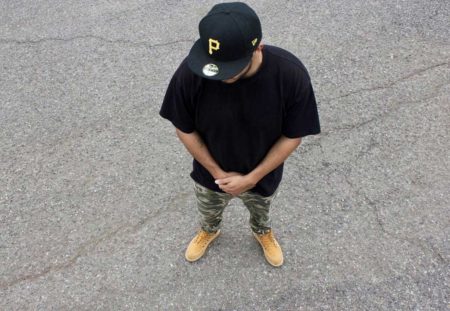 Just two lessons in, Recording Connection music business student Ernesto Trujillo (Grand Junction, CO) is putting his newfound knowledge to work! “I have a better understanding of the marketing plan cycle, I definitely used these ‘four P’s’ in releasing my first original single which got over 18k views on YouTube and much more love from our fans from many more sites. I will also be using these steps for my next project coming out in a couple of days. These steps will be very useful whenever marketing any of my music or anything else involved.” Learn more about our Music Business program.
Just two lessons in, Recording Connection music business student Ernesto Trujillo (Grand Junction, CO) is putting his newfound knowledge to work! “I have a better understanding of the marketing plan cycle, I definitely used these ‘four P’s’ in releasing my first original single which got over 18k views on YouTube and much more love from our fans from many more sites. I will also be using these steps for my next project coming out in a couple of days. These steps will be very useful whenever marketing any of my music or anything else involved.” Learn more about our Music Business program.

RRFC is education upgraded for the 21st century.
Get the latest career advice, insider production tips, and more!
Please fill out the following information, and RRFC Admissions will contact you to discuss our program offerings:
Stay in the Loop: Subscribe for RRFC news & updates!
© 2025 Recording Radio Film Connection & CASA Schools. All Rights Reserved.


